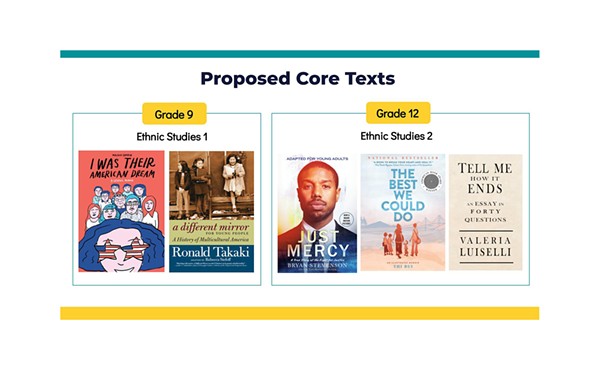[
{
"name": "Newsletter Promo",
"id": "NewsletterPromo",
"class": "inlineCenter",
"insertPoint": "4",
"component": "15264767",
"requiredCountToDisplay": "0"
},
{
"name": "Ad - Medium Rectangle CC01 - 300x250 - Inline Content",
"class": "inlineCenter",
"insertPoint": "8",
"component": "15582119",
"requiredCountToDisplay": "12"
},{
"name": "Ad - Medium Rectangle LC01 - 300x250 - Inline Content",
"class": "inlineCenter",
"insertPoint": "18",
"component": "15582122",
"requiredCountToDisplay": "22"
},{
"name": "Ad - Medium Rectangle 9 - 300x250 - Inline Content",
"class": "inlineCenter",
"insertPoint": "28",
"component": "15582121",
"requiredCountToDisplay": "32"
}]
Two years after a bill to introduce ethnic studies to high schools passed in California, the San Luis Coastal Unified School District (SLCUSD) is finalizing plans for what that would look like for students.
Assembly Bill 101 adds a one semester course in ethnic studies to the A through G graduation requirements for students graduating in 2029-30. The bill also authorizes local educational agencies, including charter schools, to require a full-year course in ethnic studies at their discretion.
SLCUSD Director for Secondary School and Adult Education Leslie O'Connor told New Times that the district's looking to split ethnic studies classes into two parts. The first half will be introduced to ninth graders and the second half will be for 12th graders.
"That was the thought process of working with stakeholders, working with our cohort of teachers, getting lots and lots of feedback, thinking, and walking through and speaking with our site administrators on what could be possible," he said. "When we started that journey back in December 2021, it wasn't that we went in with a goal with a ninth-grade course and a 12th-grade course, but through our process of feedback and discovery and best thinking ... we landed on that as we worked our way through the process."
California's Ethnic Studies Model Curriculum focuses on African American, Chicana and Latino, Native American, and Asian American and Pacific Islander histories, cultures, and struggles, and their contributions to American society, according to the state Department of Education.
SLCUSD has prepared two core readings for ninth graders who will have ethnic studies as a graduation requirement, including I Was Their American Dream—a memoir by Malaka Gharib highlighting her experience fitting into American society but not losing the customs she grew up with as half-Filipino, half-Egyptian.
Twelfth graders will have core readings including Just Mercy, a memoir by Bryan Stevenson, an attorney who founded the Equal Justice Initiative, a legal practice dedicated to defending those most desperate and in need.
During the April 16 SLCUSD board meeting where the curriculum passed unanimously, O'Connor said that staff received great feedback.
"We shared all of the communications, all the feedback, and our presentation," he said. "Our board asked really thoughtful questions, as always, and they adopted our recommendation in support of adding ethnic studies and the courses and the curriculum that we proposed."
SLCUSD is now looking to test its curriculum and get early feedback from students by offering ethnic studies as an elective beginning next school year.
"I think at this time any student could take the course since it's an elective," secondary curriculum teacher on special assignment Jane Hawley told New Times.
To help prepare teachers interested in teaching the courses, SLCUSD teamed up with Cal Poly to offer free ethnic studies classes.
"Cal Poly's ethnic studies department and the office of extended education is offering a series of four ethnic studies classes to our teacher cohort, which includes Asian American and Pacific Islander studies, African American studies, Native American studies, and then we're currently in our Latino and Latina studies course taught by Cal Poly professors," Hawley said. "The state of California is releasing funding to school districts to support professional development and material purchases for ethnic studies courses. So our district has decided to use that partially on this process so we can pay for the courses for teachers."
Taking the courses herself, Hawley said it's been a good experience to be able to learn about communities of color within SLO County.
"Cal Poly has done a great job of including California history and SLO County history as part of the courses," she said. "I think that will enrich our curriculum and our district." Δ
Latest in News
Comments (3)
Showing 1-3 of 3
Readers also liked…
-

SLO police identify alleged driver who hit and killed couple
Dec 22, 2022 -

When the levee breaks: Oceano residents, county officials walk a tightrope of regulations to manage Arroyo Grande Creek, which some say led to the levee's failure in January
May 18, 2023 -

Cal Poly report highlights offshore wind's potential to spur green energy transition
Jun 8, 2023









